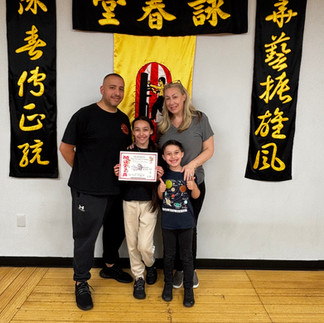The Benefits of Training Martial Arts as a Family
- Master Keith Mazza, Sr.
- Jul 31, 2025
- 2 min read

Training martial arts as a family can offer numerous benefits, including:
1. Bonding and Quality Time:
Shared Experiences - Participating in classes or practice sessions allows family members to share their experiences, challenges, and triumphs, deepening their connection.
Support System - Family members can motivate and encourage each other, building a strong support system that enhances emotional bonds.
2. Physical Fitness:
Comprehensive Workout - Martial arts training encompasses a variety of exercises, including strength training, cardiovascular workouts, and flexibility exercises, making it a comprehensive fitness regimen.
Healthy Habits - Regular training can instill lifelong healthy habits in children and encourage a family culture of fitness.
3. Discipline and Focus:
Structured Learning -Martial arts classes usually follow a structured curriculum that requires focus and discipline to master techniques and advance in rank.
Life Skills - These skills translate into academic and professional settings, where focus and discipline are essential for success.
4. Self-Defense Skills:
Confidence Boost - Knowing that they can defend themselves boosts self-esteem and confidence in both children and adults, helping them feel more secure in various situations.
Awareness and Prevention - Training teaches not only physical techniques but also awareness of surroundings, promoting proactive safety measures.
5. Emotional Resilience:
Facing Challenges Martial arts often involves facing physical and mental challenges, teaching practitioners how to overcome obstacles and setbacks.
6. Stress Management:
Learning to control emotions during practice helps build emotional resilience, equipping family members to handle stress in daily life.
7. Respect and Teamwork:
Martial Arts Etiquette - The practice teaches respect for instructors and fellow students, instilling values of humility and gratitude.
Collaborative Learning - Training often involves partner work, fostering teamwork and cooperation, which can enhance family dynamics.
8. Stress Relief:
Physical Outlet- The physical exertion involved in martial arts is a great way to release pent-up energy and stress, leading to a more relaxed state of mind.
Mindfulness - Many martial arts incorporate elements of mindfulness and meditation, promoting mental clarity and emotional well-being.
9. Goal Setting and Achievement:
Progress Tracking - The belt system in martial arts provides clear goals and milestones, giving family members something tangible to work toward together.
Celebrating Achievements - Accomplishing goals, such as earning a new belt, can be a shared celebration that strengthens family pride and motivation.
10. Community and Social Interaction:
Building Relationships - Training together can help families form friendships with other
students and families in the dojo, creating a sense of belonging.
11. Supportive Environment:
Being part of a martial arts community can provide additional support outside the family unit, enhancing social skills and connections.
12. Cultural Education:
Learning History Many martial arts have rich traditions and philosophies, providing opportunities for families to learn about different cultures and histories.
13. Values and Philosophy:
Understanding the underlying values of martial arts—such as respect, perseverance, and integrity—can enrich family discussions and values.
Overall, training martial arts together as a family fosters a unique combination of physical, emotional, and social benefits, creating a well-rounded and supportive family environment. It encourages personal growth while simultaneously strengthening family ties, making it a rewarding journey for everyone involved.
















